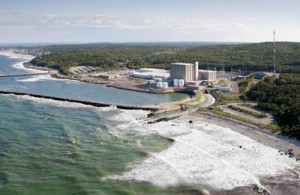
COURTESY PILGRIM NUCLEAR POWER STATION
PLYMOUTH- Representatives from the Nuclear Decommissioning Citizens Advisory Panel met with members of the Nuclear Regulatory Commission in Plymouth recently to discuss dry cask storage of spent fuel from the Pilgrim Nuclear Power Station.
Attendees listened to the NRC’s staff members, who explained their process of watching over decommissions and cask storage.
Sean Mullin, co-chair of the NDCAP, said the reception from residents was mixed.
He praised the NRC for how they openly spoke about the regulation process and how casks can be examined. However, he knocked the NRC for their lack of action when it comes to liability.
“The NRC’s process is really a ‘see no evil, speak no evil, hear no evil…’ type of a process,” Mullin said.
Specifically, Mullin was critical that the NRC has not pushed Holtec International to say how long the casks will be warrantied by the company.
He pointed out that the shelf life of the spent fuel is “tens of thousands of years,” yet Holtec is unable to guarantee what will happen if there is a problem with the toxic materials and who is financially responsible in that case.
Mullin also explained that there is no federal plan or timeline to dispose of the dangerous materials in Plymouth.
He said that the federal government has promised that a plan will be established since Eisenhower’s administration, and that the federal government has breached their contract with state and local governments with their inaction.
“The bottom line is the regulations do not protect the safety of the citizens of the host communities, or for that matter, the region and the nation,” he said.
While Mullin is personally not concerned about Holtec’s ability to decommission the plant, he is worried that there are not plans in place to address potential short-term problems and long-term solutions to remove the materials across the nation.
Neil Sheehan, a spokesman for the NRC, said that the commission considers the cask system to be a safe way to store spent nuclear fuel.
Periodic checks are conducted to ensure the casks meet NRC regulations, according to Sheehan, and security measures of the storage spaces are also reviewed.
Mullin called upon Congress and the Trump administration to act on the matter.























